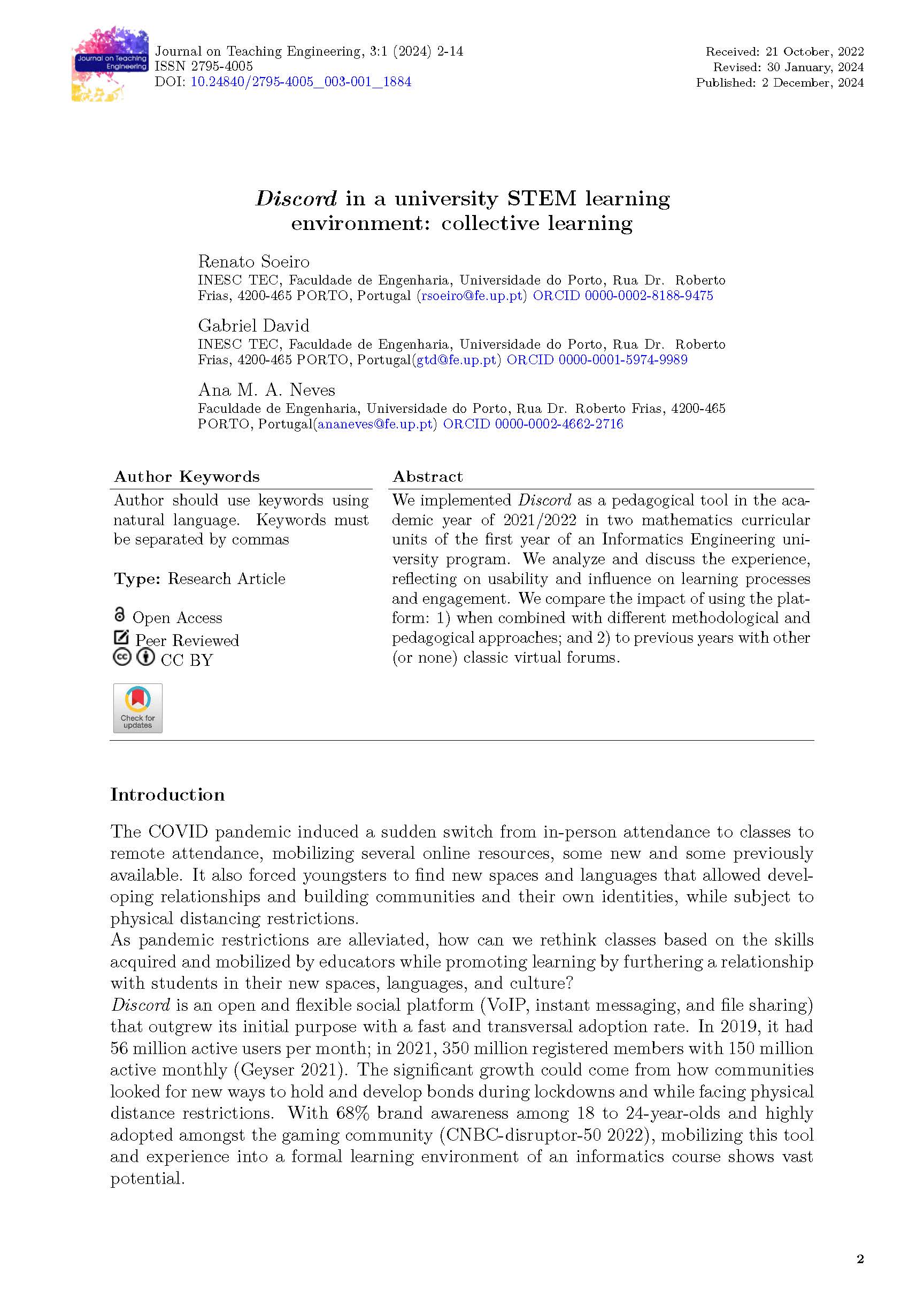Discord in a university STEM learning environment: collective learning
Main Article Content
Abstract
We implemented Discord as a pedagogical tool in the academic year of 2021/2022 in two mathematics curricular units of the first year of an Informatics Engineering university program. We analyze and discuss the experience, reflecting on usability and influence on learning processes and engagement. We compare the impact of using the platform: 1) when combined with different methodological and pedagogical approaches; and 2) to previous years with other (or none) classic virtual forums.
Article Details

This work is licensed under a Creative Commons Attribution 4.0 International License.
References
Bayne, Sian. 2015. “What’s the matter with ‘technology-enhanced learning’?” Learning,
Media and Technology 40 (1): 5–20. 10.1080/17439884.2014.915851.
CNBC-disruptor-50. 2022. Discord - How digital natives converse. Web Page. https://
www.cnbc.com/2022/05/17/discord-disruptor-50.html.
Dale, Robin, Steven Robertson, and Tim Shortis. 2004. “You can’t not go with the technological flow, can you?” Journal of Computer Assisted Learning 20:456–470.
Dennen, V. P. 2008. “Pedagogical lurking: Student engagement in non-posting discussionbased courses.” Journal of Educational Computing Research 39 (4): 395–413.
DeRosa, Robin, and Scott Robison. 2015. “Pedagogy, Technology, and the Example of
Open Educational Resources.” EDUCAUSE Review (November). https://er.educause.
edu/articles/2015/11/pedagogy-technology-and-the-example-of -open-educationalresources.
Freire, P. 2014. Pedagogia da autonomia: Saberes necessários à prática educativa. Paz e
Terra. isbn: 978-85-7753-226-1.
Garrison, D. Randy, Terry Anderson, and Walter Archer. 2000. “Critical inquiry in a
text-based environment: Computer conferencing in higher education.” The Internet
and Higher Education 2 (2-3): 87–105.
Geyser, Werner. 2021. “Discord Statistics: Revenue, Users & More.” Accessed April 24,
https://influencermarketinghub.com/discord-stats/.
Oliver, Ron, and Jan Herrington. 2003. “Exploring Technology-Mediated Learning from
a Pedagogical Perspective.” Interactive Learning Environments 11 (2): 111–126.
Sauer, Juergen, Andreas Sonderegger, and Sven Schmutz. 2020. “Usability, user experience
and accessibility: towards an integrative model.” PMID: 32450782, Ergonomics 63
(10): 1207–1220. 10.1080/00140139.2020.1774080.
Selwyn, Neil. 2010. “Looking beyond learning: Notes towards the critical study of educational technology.” Journal of Computer Assisted Learning 26:65–73.
Siemens, G. 2005. “Connectivism: A learning theory for the digital age.” International
Journal of Instructional Technology and Distance Learning 2 (1): 3–10.
Vygotsky, L. S. 1978. Mind in society: The development of higher psychological processes.
Harvard University Press.

